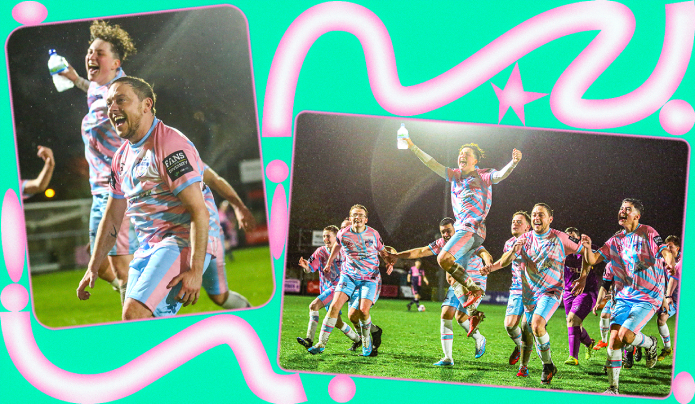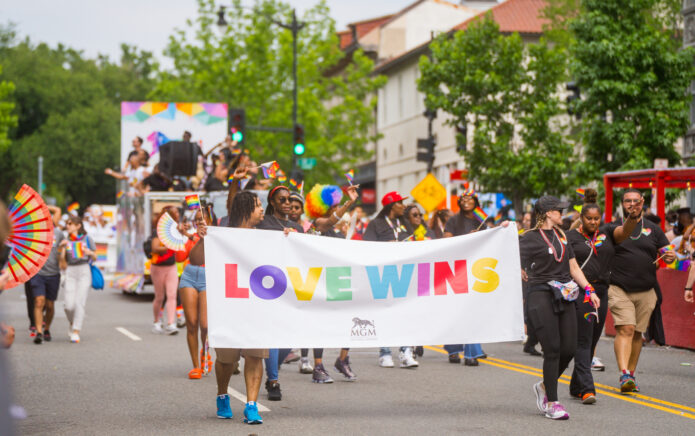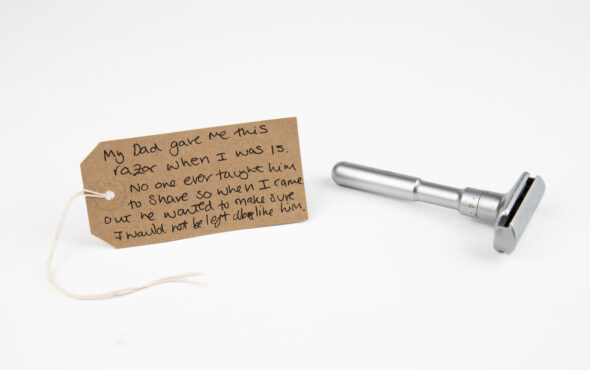
This is State of Play, a new column by GAY TIMES Contributing Editor Jamie Windust. Every month, Jamie will be jumping, running and diving head-first into the world of sport, movement and fitness.
Exploring queer sporting excellence at every level, they’ll also be reporting on the changes that need to be made in order to make the world of sport fully accessible to all within the community.
There was something so exciting about putting on my football kit as a kid. Slipping on a shiny pair of shorts and a matching football shirt, then pulling knee-length socks over shin pads to complete the ensemble. It felt like being part of something, so while I wasn’t ever very good, having a part to play in a team was exciting enough.
As puberty hit, I realised that although my interest in football continued, things around me had changed. Due to being an openly queer person at my school, I began to doubt my cohesion with the rest of the team. Despite wanting to still be involved with the game, I saw my identity as a hindrance – I just didn’t feel like I could fit in with a heteronormative world filled with locker room talk and Lynx.
Football’s culture is changing, but not quickly enough
While I never did return to the pitch, a lot has changed in the fifteen years since I last laced up my football boots. Players on and off the pitch have advocated for LGBTQIA+ inclusion, some becoming involved in Stonewall’s Rainbow Laces campaign and others showing their support for LGBTQIA+ fan groups such as Gay Gooners and Rainbow Toffees. At an institutional level, the Football Association (FA) has taken a tough stance on homophobic chants, slapping the Wolverhampton Wanderers with a £100,000 club fine after fans shouted anti-LGBTQIA+ slurs during a match against Chelsea.
View this post on Instagram
However, these advancements have been overshadowed in recent years by the discourse surrounding FIFA’s choice of host nation for the World Cup. In 2018, the tournament was hosted in Russia and later, in 2022, hosted in Qatar – both countries known for their political stances against LGBTQIA+ rights. In the eyes of many queer fans, these decisions contradict efforts to make the sport more welcoming to the LGBTQIA+ community.
It’s also hard to ignore the lack of openly LGBTQIA+ figures – in the men’s game at least. Bradford Park Avenue forward Jake Daniels and league two Scottish footballer Zander Murray are the only openly gay, professional male footballers in the UK, a stark contrast to the visibly queer players enriching professional women’s teams across the UK. Across the board, there’s a lack of openly trans and non-binary talent with Canadian footballer Quinn being the only known trans, non-binary professional player currently competing at the elite level.
View this post on Instagram
At all levels of the game, trans inclusion is lacking
Whether it’s athletics, cycling or even fishing, each day seems to bring a new ban on trans athletes in sport.
And while these bans are set at an elite level, they send a dangerous message that trans people aren’t welcome in sport: in the 2022/2023 season there was a 50% year-on-year increase in “gender reassignment based discrimination” in grassroots English football.
I’d imagine that, just as I did as a young queer person on my football team, young trans people find themselves doubting if there’s space for them at all. This isn’t helped by the current FA rules on trans participation in English football, which were set in 2014. Throughout the policy, which makes no mention of non-binary participants, trans players’ inclusion is not only subject to case-by-case review but requires them to supply medical records to verify their testosterone levels.
View this post on Instagram
While currently more positive than those in place in many other sports, these FA rules subject trans players to invasive processes and, many would argue, do not do enough to protect gender diverse communities – despite the FA issuing guidance in 2016 which aimed to reduce transphobia within the sport. We can see the failings in practice, too. In late 2023, Francesca Needham, a trans player in a lower-league South Yorkshire team, announced that she had quit football and was contemplating pursuing a discrimination case via the FA. The statement came after other teams refused to play against her, following an alleged incident where an opposition player broke their knee while blocking one of Needham’s shots. (It’s worth pointing out here that the fastest strike of the Premier League in the 2022 – 2023 season was by cis female player Chloe Kelly – reminding us that cis women are some of the most powerful strikers in the world.)
Members and fans of Needham’s club rallied around her but press coverage surrounding her announcement, however, did not lead to positive change – far from it. Within weeks, 48 UK MPs and 27 peers signed a letter urging the FA to ban all trans women and transfeminine individuals from the women’s game, citing a desire to “protect women and girls” in the sport. Of course, sympathy is due to the injured player. But using this isolated and unfortunate incident to stoke up controversy, encourage transphobia on the pitch and even introduce a blanket ban at an institutional level isn’t just unfair – it’s dehumanising.
Needham’s situation has made it clear that trans players will still be penalised, whether it’s by peers or politicians, no matter the ridiculous lengths they are forced to go to in order to prove their gender. It also shows that speaking up about inequalities can negatively and disproportionately impact trans players – namely by alerting anti-trans detractors of another opportunity to push trans women out of sport entirely. But that doesn’t mean we should give up. The rising anti-trans atmosphere in football – and all other sports – needs to be challenged, and when cis players act in solidarity with their trans peers, positive movement can be made.
View this post on Instagram
Already, in 2022, the inadequacies of the FA policy had come into sharp focus during an amateur five-a-side women’s tournament in East London. Here, team Hells Bells (then known as Camden Bells) accused the association of being “outright transphobic” following an alleged incident where an official of the FA-backed Super 5 League suggested that their non-binary player shouldn’t be allowed to participate in a “women’s league.”
Hells Bells launched a successful boycott of the league, before co-founding Clubs United: the UK’s first trans inclusive football network and a thriving safe space for trans, GNC and women players. The takeaway? When institutions don’t work for our communities, it’s time to forge our own solutions – and keep the LGB firmly with the T.
Grassroots solutions
Of course, the conversation around trans inclusion at an elite level is important and shouldn’t take a back seat. After all, recent developments in the world of women’s football – namely the government-backed recommendations that the FA commit to the full professionalisation of the women’s game – show that the archaic rules of the game can and should be updated for modern times.
However, there’s no denying that the gender binary is deeply ingrained in professional sports – it’s likely that unpicking this system will be a drawn-out process. In the interim, more casual players can look towards the thriving world of LGBTQIA+ teams. Here, weekly kickabouts allow players of all identities to get stuck into their favourite sport. These are teams where queer and trans inclusion is a prerequisite – not an afterthought.
View this post on Instagram
TRUK United FC, which is headquartered in London but welcomes players across the UK, is a prime example. Open to all, but with matches and teams subject to restrictions depending on opponents, the club was founded in 2021 by Lucy Clark, English football’s first transgender referee. A year later, in 2022, the club made history after their all trans women team played a match against Dulwich Hamlet Women’s FC on Trans Day of Visibility.
It seems the club is turning making history into a habit. On the following Trans Day of Visibility, a TRUK United FC team solely consisting of trans men and transmasculine people (the first of its kind in Europe) played against cis male players from Dulwich Hamlet FC Supporters Team.
Reflecting on that evening, Clark has fond memories. “People attended on a rainy night in Dulwich and the whole evening was full of trans joy,” she proudly explains. “The night will live in the memory of everyone that was in attendance for a long time to come.” Going into 2024, she has one clear goal in mind: “We also plan to have a team solely of non-binary people soon.”
So proud to have been captain of the first ever football team of all transgender men in Europe!
It was such a special night, thank you to the boys for being incredible and to all our supporters!
Football is for everyone. 🏳️⚧️🏳️⚧️🏳️⚧️#TransDayOfVisibility pic.twitter.com/t2FlIvcBCC
— Arthur Webber 🏳️🌈🏳️⚧️ (@BernieTranders) March 31, 2023
Arthur Webber, who captained the TRUK United FC match against Dulwich, explains that playing football amongst cis players can come with the kind of psychological stress that isn’t present in trans-centred environments. “[Before] I felt a need to prove my worth to the cis players and a lot of pressure to perform,” Webber explains. Conversely, playing on a transmasculine team has helped him to rediscover his confidence as a player.
This is a similar story to that of Paula Griffin, a member of the TRUK United FC Women’s team and goalkeeper for the Clapton CFC Women’s first team. For her, TRUK United FC helped to reintegrate her back into the sport by creating a truly inclusive environment. “Having the opportunity to play for TRUK opened up my eyes to the possibility of playing competitive football for the first time since my youth,” Griffin explains.
As a community organiser, Clark’s passion for trans inclusivity and, more crucially, trans joy within sport is evident. “It’s really important that trans people continue to play whatever sport they love, this goes for the whole LGBTQIA+ community,” she says. “Sport is great for physical and mental health and people should not stop playing sport just because of their identity.”
As human beings it’s vital for our sense of purpose and quality of life to be able to proudly and safely pursue our passions and interests – a basic need many trans people can struggle to attain in the world of sport because of discrimination and exclusionary regulations. As clubs like TRUK United FC continue to thrive, let’s hope they allow more and more trans people to safely take to the pitch to focus on what really matters – getting that ball firmly in the back of the net.


